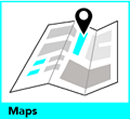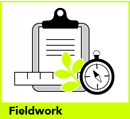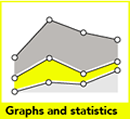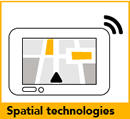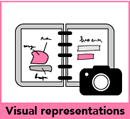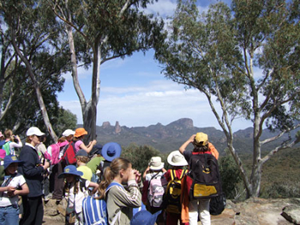
This section of the course is designed to enhance your understanding of the Geography K–10 Syllabus overall. Particular attention is given to how the learning in your chosen stage develops students’ ability to think and work geographically. Learning across the curriculum (LAC) content is also discussed.
Stage statements are summaries of the knowledge, understanding, skills, values and attitudes that are developed by students as a result of achieving the outcomes for the relevant stage of learning.
Each stage statement for K–10 consists of two paragraphs, describing respectively the:
-
knowledge and understanding, concepts and outcomes addressed
-
inquiry skills and tools developed across the stage.
|
|
Activity 2: Stage Statements Read the stage statement corresponding to your chosen stage and note the key knowledge, understanding, skills, values and attitudes developed. Record these in your Activity booklet. Now read the stage statements for the stages before and after your chosen stage. Note and record the development that is anticipated as students progress. |
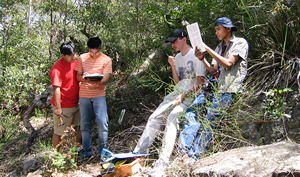
A single set of objectives governs all learning in Geography K–10. These objectives are high level statements regarding students’:
-
development of geographical knowledge and understanding
-
application of geographical tools
-
development of geographical inquiry skills.
Geography outcomes are stage-specific and establish the progression of learning to meet the objectives. The number of outcomes increases as school progresses. At least one outcome per stage relates to the application of geographical tools and the development of geographical inquiry skills.
The continuum of learning in the Geography K–10 Syllabus:
-
provides information about learning in geography from Kindergarten to year 10
-
supports curriculum planning and programming based on syllabus outcomes and content descriptions
-
supports the transition between stages, especially from Stage 3 to Stage 4
-
provides concept and skill descriptions that can support teachers when differentiating learning in all stages.
|
|
The K–10 continuum of learning can be viewed online either as a Table of objectives and outcomes - continuum of learning or Table of outcomes linked to content. |
|
|
Activity 3: Objectives and outcomes Read the outcomes for your chosen stage. How do these outcomes fulfil the requirements of the objectives? Record your answer in your Activity booklet. |
The geographical concepts are integral to the development of geographical understanding. They are ideas that can be applied across the subject to identify a question or guide an investigation.
Concepts are also the key ideas involved in teaching students to think geographically. There are seven concepts taught in the Geography K–10 Syllabus.
|
Place: identifiable parts of Earth’s surface Space: the organisation, patterns and distribution of places Environment: total surroundings and relevant natural and human processes Interconnection: the links between people and environments Scale: the levels at which geographical phenomena are examined Sustainability: the capacity of the environment to continue to support life Change: developments and variations over time |
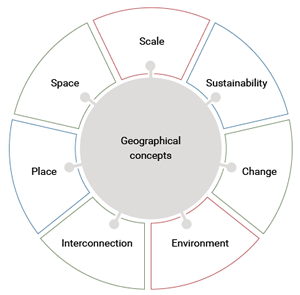 |
|
|
The K–10 geographical concepts continuum outlines when each concept is introduced and provides examples of how students’ understanding is expected to develop. The continuum shows the increasingly sophisticated ways students consider each concept as their learning progresses. |
The formal introduction of the seven concepts is staggered across K–6:
-
Early Stage 1 - three concepts (place, space and environment)
-
Stage 1 - five concepts (adds interconnection and scale)
-
Stage 2 - six concepts (adds sustainability)
-
Stage 3 - all seven concepts are taught (adds change).
In practice, many geographical inquiries in K–4 will address aspects of all seven concepts.
|
|
Activity 4: Geographical concepts Choose one of the seven concepts taught in geography K–10. Compare the ways students are expected to demonstrate an understanding of this concept on your chosen stage with the stages before and after. Record your observations in your Activity booklet. |
Geographical skills
All students K–10 are taught to use the geographical inquiry process.

|
|
The K–10 geographical inquiry skills continuum outlines the expectations for students at each point of their learning. Review the skills expected at your chosen stage and compare these to the stages before and after. |
|
|
Activity 5: Geographical inquiry process What are the benefits of using an inquiry process to teach geographical skills? What challenges will this present in your local context? Record your thoughts in your Activity booklet. |
Geographical tools
Geographers use geographical tools to acquire, process and communicate geographical information during an inquiry. All students K–10 are taught to use geographical tools. These tools are categorised under five headings.
|
|
Maps take many forms and include digital and non-digital mediums. They are used to locate, visualise, represent, display and record spatial data. |
|
|
Fieldwork involves observing, measuring, collecting and recording information outside the classroom. Fieldwork can be undertaken within the school grounds, around local areas or at more distant locations. Virtual fieldwork is possible using information and communication technologies. |
|
|
Graphs (also called charts) and statistics take many forms, including digital and non-digital mediums. They are used to collate, organise, illustrate, summarise and compare patterns, relationships and trends in geographical data and information. |
|
|
Spatial technologies include any software or hardware that interacts with real world locations. They are used to visualise, manipulate, analyse, display and record spatial data. |
|
|
Visual representations take many forms and include digital and non-digital mediums. They are used to record, display, visualise, analyse and communicate geographical data and information. |
Students are to be provided with opportunities to engage with each of the geographical tools during each stage of learning. Teachers will make decisions about the specific geographical tools appropriate to support the intended learning for the stage.
It is intended that students progressively move from using tools to interpret geographical data and information in the earlier stages of learning, to being able to develop and create tools for representing, synthesising and communicating the findings of geographical inquiry.
|
|
The K–10 geographical tools continuum provides examples of tools students may use in each stage of learning. |
How might the K–10 geographical inquiry skills continuum and the K–10 geographical tools continuum assist in differentiating the learning to meet the needs of students in your class?
Learning across the curriculum (LAC) content
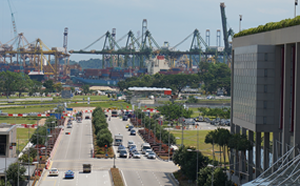
© A Southwell
Learning across the curriculum content is a common feature of all new BOSTES NSW syllabuses.
It is important when programming that you consider learning across the curriculum connections.
Learning across the curriculum content is automatically included in the syllabus content descriptions for geography and identified by the relevant icon.
|
|
Refer to Learning across the curriculum in the geography syllabus. |
It has been suggested that the Geography K–10 Syllabus reflects many of the emphases in the learning across the curriculum content. Do you agree?
The content of the Geography K–10 Syllabus is divided into focus areas:
-
Early Stage 1 - one focus area
-
Stages 1–3 - two focus areas
-
Stages 4–5 - four focus areas.
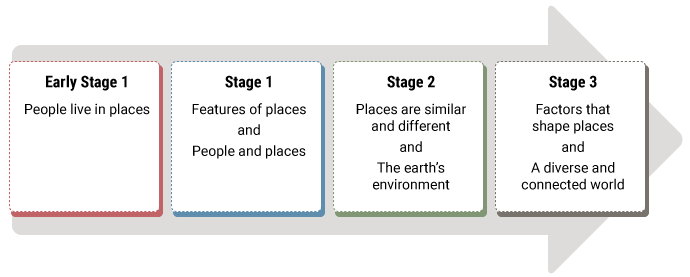
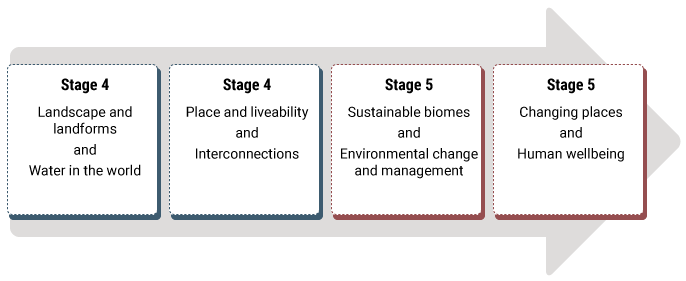
|
|
The Geography K–10 content section of the online syllabuses shows the progression of the 15 focus areas. Each focus area can be clicked to show its syllabus details. The next section of this course leads participants through a detailed examination of one stage and one focus area. |
If you have not done so already, select one stage and one focus area on which you would like to concentrate for the remainder of the course.



